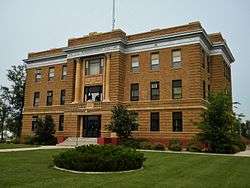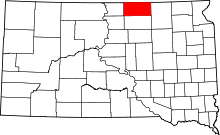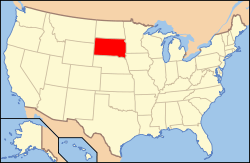McPherson County, South Dakota
| McPherson County, South Dakota | |
|---|---|
 McPherson County Courthouse | |
 Location in the U.S. state of South Dakota | |
 South Dakota's location in the U.S. | |
| Founded | 1884 |
| Named for | James B. McPherson |
| Seat | Leola |
| Largest city | Eureka |
| Area | |
| • Total | 1,152 sq mi (2,984 km2) |
| • Land | 1,137 sq mi (2,945 km2) |
| • Water | 15 sq mi (39 km2), 1.3% |
| Population (est.) | |
| • (2015) | 2,415 |
| • Density | 1.3/sq mi (1/km²) |
| Congressional district | At-large |
| Time zone | Central: UTC-6/-5 |
| Website |
mcpherson |
McPherson County is a county located in the U.S. state of South Dakota. As of the 2010 census, the population was 2,459.[1] Its county seat is Leola.[2]
History
The county was created in 1873 and organized in 1884.[3] It is named after American Civil War General James B. McPherson.[4]
Geography
According to the U.S. Census Bureau, the county has a total area of 1,152 square miles (2,980 km2), of which 1,137 square miles (2,940 km2) is land and 15 square miles (39 km2) (1.3%) is water.[5]
The Samuel H. Ordway, Jr., Memorial Prairie is a 7,800-acre (3,200 ha) grassland owned by The Nature Conservancy. It lies on the south side of South Dakota Highway 10 about 10 miles (16 km) west of Leola, and is home to a bison herd.[6][7]
Major highways
 South Dakota Highway 10
South Dakota Highway 10 South Dakota Highway 45
South Dakota Highway 45 South Dakota Highway 47
South Dakota Highway 47 South Dakota Highway 247
South Dakota Highway 247 South Dakota Highway 239
South Dakota Highway 239
Adjacent counties
- McIntosh County, North Dakota - north
- Dickey County, North Dakota - northeast
- Brown County, South Dakota - east
- Edmunds County, South Dakota - south
- Campbell County, South Dakota - west
Demographics
| Historical population | |||
|---|---|---|---|
| Census | Pop. | %± | |
| 1890 | 5,940 | — | |
| 1900 | 6,327 | 6.5% | |
| 1910 | 6,791 | 7.3% | |
| 1920 | 7,705 | 13.5% | |
| 1930 | 8,774 | 13.9% | |
| 1940 | 8,353 | −4.8% | |
| 1950 | 7,071 | −15.3% | |
| 1960 | 5,821 | −17.7% | |
| 1970 | 5,022 | −13.7% | |
| 1980 | 4,027 | −19.8% | |
| 1990 | 3,228 | −19.8% | |
| 2000 | 2,904 | −10.0% | |
| 2010 | 2,459 | −15.3% | |
| Est. 2015 | 2,415 | [8] | −1.8% |
| U.S. Decennial Census[9] 1790-1960[10] 1900-1990[11] 1990-2000[12] 2010-2015[1] | |||
2000 census
As of the census[13] of 2000, there were 2,904 people, 1,227 households, and 822 families residing in the county. The population density was 3 people per square mile (1/km²). There were 1,465 housing units at an average density of 1 per square mile (0/km²). The racial makeup of the county was 99.35% White, 0.28% Native American, 0.14% Asian, 0.03% from other races, and 0.21% from two or more races. 0.21% of the population were Hispanic or Latino of any race.
There were 1,227 households out of which 23.60% had children under the age of 18 living with them, 62.10% were married couples living together, 2.70% had a female householder with no husband present, and 33.00% were non-families. 31.10% of all households were made up of individuals and 19.20% had someone living alone who was 65 years of age or older. The average household size was 2.31 and the average family size was 2.91.
In the county, the population was spread out with 22.20% under the age of 18, 4.50% from 18 to 24, 20.10% from 25 to 44, 23.60% from 45 to 64, and 29.60% who were 65 years of age or older. The median age was 48 years. For every 100 females there were 93.70 males. For every 100 females age 18 and over, there were 91.40 males.
The median income for a household in the county was $22,380, and the median income for a family was $29,811. Males had a median income of $23,705 versus $17,850 for females. The per capita income for the county was $12,748. About 17.00% of families and 22.60% of the population were below the poverty line, including 25.80% of those under age 18 and 22.20% of those age 65 or over.
2010 census
As of the 2010 United States Census, there were 2,459 people, 1,025 households, and 632 families residing in the county.[14] The population density was 2.2 inhabitants per square mile (0.85/km2). There were 1,418 housing units at an average density of 1.2 per square mile (0.46/km2).[15] The racial makeup of the county was 98.2% white, 0.2% Asian, 0.1% Pacific islander, 0.2% from other races, and 1.3% from two or more races. Those of Hispanic or Latino origin made up 1.0% of the population.[14] In terms of ancestry, 74.5% were German, 17.7% were Russian, 7.3% were Norwegian, 6.7% were English, and 2.5% were American.[16]
Of the 1,025 households, 19.5% had children under the age of 18 living with them, 54.1% were married couples living together, 4.3% had a female householder with no husband present, 38.3% were non-families, and 36.3% of all households were made up of individuals. The average household size was 2.06 and the average family size was 2.66. The median age was 50.8 years.[14]
The median income for a household in the county was $31,923 and the median income for a family was $47,500. Males had a median income of $31,953 versus $27,941 for females. The per capita income for the county was $19,255. About 12.5% of families and 16.5% of the population were below the poverty line, including 21.3% of those under age 18 and 27.1% of those age 65 or over.[17]
Communities
Cities
Towns
Unincorporated community
Townships
The county is divided into five townships:
See also
References
- 1 2 "State & County QuickFacts". United States Census Bureau. Retrieved November 25, 2013.
- ↑ "Find a County". National Association of Counties. Retrieved 2011-06-07.
- ↑ "Dakota Territory, South Dakota, and North Dakota: Individual County Chronologies". Dakota Territory Atlas of Historical County Boundaries. The Newberry Library. 2006. Retrieved March 30, 2015.
- ↑ Gannett, Henry (1905). The Origin of Certain Place Names in the United States. U.S. Government Printing Office. p. 195.
- ↑ "2010 Census Gazetteer Files". United States Census Bureau. August 22, 2012. Retrieved March 28, 2015.
- ↑ Grove, Noel (December 1988). "Quietly Conserving Nature". National Geographic. 174 (6): 841.
- ↑ "Samuel H. Ordway, Jr., Memorial Prairie". The Nature Conservancy. Retrieved May 13, 2015.
- ↑ "County Totals Dataset: Population, Population Change and Estimated Components of Population Change: April 1, 2010 to July 1, 2015". Retrieved July 2, 2016.
- ↑ "U.S. Decennial Census". United States Census Bureau. Retrieved March 28, 2015.
- ↑ "Historical Census Browser". University of Virginia Library. Retrieved March 28, 2015.
- ↑ Forstall, Richard L., ed. (March 27, 1995). "Population of Counties by Decennial Census: 1900 to 1990". United States Census Bureau. Retrieved March 28, 2015.
- ↑ "Census 2000 PHC-T-4. Ranking Tables for Counties: 1990 and 2000" (PDF). United States Census Bureau. April 2, 2001. Retrieved March 28, 2015.
- ↑ "American FactFinder". United States Census Bureau. Retrieved 2011-05-14.
- 1 2 3 "DP-1 Profile of General Population and Housing Characteristics: 2010 Demographic Profile Data". United States Census Bureau. Retrieved 2016-03-12.
- ↑ "Population, Housing Units, Area, and Density: 2010 - County". United States Census Bureau. Retrieved 2016-03-12.
- ↑ "DP02 SELECTED SOCIAL CHARACTERISTICS IN THE UNITED STATES – 2006-2010 American Community Survey 5-Year Estimates". United States Census Bureau. Retrieved 2016-03-12.
- ↑ "DP03 SELECTED ECONOMIC CHARACTERISTICS – 2006-2010 American Community Survey 5-Year Estimates". United States Census Bureau. Retrieved 2016-03-12.
 |
McIntosh County, North Dakota | Dickey County, North Dakota |  | |
| Campbell County | |
Brown County | ||
| ||||
| | ||||
| Edmunds County |
Coordinates: 45°46′N 99°13′W / 45.77°N 99.22°W